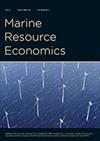理解渔民行为:以印度尼西亚的鲷鱼渔民为例
IF 1.7
3区 经济学
Q2 ECONOMICS
引用次数: 1
摘要
将渔民的动机和行为纳入渔业管理模式非常重要。错误的行为假设可能产生无效的激励或干预措施,甚至产生意想不到的后果。为了了解发展中国家的渔民行为,我们调查了93名印尼鲷鱼渔民。研究结果表明,他们在决定在哪里钓鱼以及钓什么鱼时,会考虑收入、个人声誉和社会文化规范等相互竞争的方面;他们通过直接观察、对地理相似性的推断以及与其他渔民的社会互动,更新对目标鱼类种群的位置、丰富性和可捕性的信念,并评估经济和社会满意度。信息共享和社会知识可能是特定于港口的,代表了当地的社会文化规范,而不是与船只大小、目标捕获量或其他人口统计数据有关。信息共享和模仿模式的盛行表明,印尼鲷鱼渔业中的渔民决策具有重要的社会文化成分。我们讨论了对渔业管理模式和政策决策的影响。本文章由计算机程序翻译,如有差异,请以英文原文为准。
Understanding Fisher Behavior: The Case of Snapper Fishers in Indonesia
It is important to incorporate fisher motivations and behavior into fisheries management models. Incorrect behavioral assumptions may yield ineffective incentives or interventions or even produce unintended consequences. To understand fisher behavior in a developing country, we surveyed 93 Indonesian snapper fishers. Results suggest they consider competing aspects such as income, personal reputation, and sociocultural norms when deciding where and what to fish; they update beliefs about location, bountifulness, and catchability of target fish stocks through direct observations, inferences over geographical similarities, and social interactions with other fishers, and they evaluate satisfaction economically as well as socially. Information sharing and social knowledge are likely port-specific, representing local sociocultural norms rather than being related to vessel size, target catch, or other demographics. The prevalence of information sharing and imitation patterns suggests that fisher decision-making in Indonesian snapper fisheries has a significant sociocultural component. We discuss implications for fisheries management models and for policy decisions.
求助全文
通过发布文献求助,成功后即可免费获取论文全文。
去求助
来源期刊

Marine Resource Economics
农林科学-渔业
CiteScore
4.30
自引率
10.30%
发文量
25
审稿时长
>12 weeks
期刊介绍:
Marine Resource Economics (MRE) publishes creative and scholarly economic analyses of a range of issues related to natural resource use in the global marine environment. The scope of the journal includes conceptual and empirical investigations aimed at addressing real-world oceans and coastal policy problems. Examples include studies of fisheries, aquaculture, seafood marketing and trade, marine biodiversity, marine and coastal recreation, marine pollution, offshore oil and gas, seabed mining, renewable ocean energy sources, marine transportation, coastal land use and climate adaptation, and management of estuaries and watersheds.
 求助内容:
求助内容: 应助结果提醒方式:
应助结果提醒方式:


